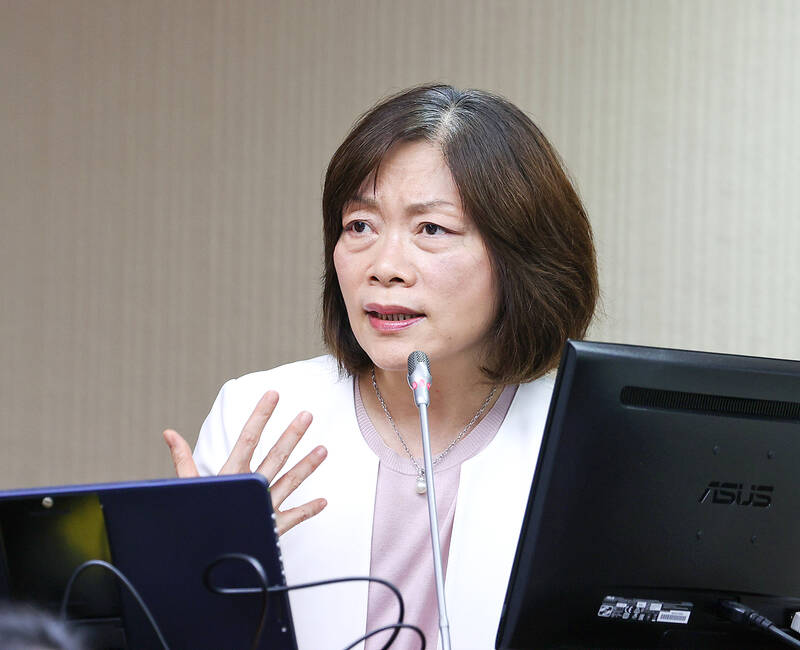The manufacturing industry would be the first to accept workers from India, starting with no more than 1,000 no sooner than a year from now, Minister of Labor Ho Pei-shan (何佩珊) said yesterday.
Ho and other labor officials appeared in front of two legislative committees, which were jointly reviewing a memorandum of understanding signed with New Delhi earlier this year on accepting migrant workers from India.
The legislature must now ratify the agreement and supporting measures drafted by the Ministry of Labor.

Photo: CNA
The first phase would involve only a small number of workers, Workforce Development Agency Director-General Tsai Meng-liang (蔡孟良) said.
Priority would be given to direct hiring and “quality” intermediaries commissioned by the government, Tsai said.
Effort would also be made to ensure that the incoming workers do not “destabilize” the country, and adapt to its language and culture, he added.
The ministry is still deciding how to enable direct hires, and is considering a new method, Ho said, without elaborating.
The memorandum of understanding states that Taiwan decides on the number of workers that may be hired and the quotas per industry.
Ho said that the ministry has already sought opinions from the Chinese National Federation of Industries, and would consult with employers after the agreement is finalized to determine which industries most require additional labor.
The number of workers brought in for the initial trial phase would not exceed 1,000, Ho said.
No specific timeline has been set either, she said, adding that it would take more than a year.
Asked whether the quota would be greatly expanded in two or three years, Ho said that things must “of course proceed step by step,” or the incoming workers might find it hard to adapt to Taiwan.

CARROT AND STICK: While unrelenting in its military threats, China attracted nearly 40,000 Taiwanese to over 400 business events last year Nearly 40,000 Taiwanese last year joined industry events in China, such as conferences and trade fairs, supported by the Chinese government, a study showed yesterday, as Beijing ramps up a charm offensive toward Taipei alongside military pressure. China has long taken a carrot-and-stick approach to Taiwan, threatening it with the prospect of military action while reaching out to those it believes are amenable to Beijing’s point of view. Taiwanese security officials are wary of what they see as Beijing’s influence campaigns to sway public opinion after Taipei and Beijing gradually resumed travel links halted by the COVID-19 pandemic, but the scale of

TRADE: A mandatory declaration of origin for manufactured goods bound for the US is to take effect on May 7 to block China from exploiting Taiwan’s trade channels All products manufactured in Taiwan and exported to the US must include a signed declaration of origin starting on May 7, the Bureau of Foreign Trade announced yesterday. US President Donald Trump on April 2 imposed a 32 percent tariff on imports from Taiwan, but one week later announced a 90-day pause on its implementation. However, a universal 10 percent tariff was immediately applied to most imports from around the world. On April 12, the Trump administration further exempted computers, smartphones and semiconductors from the new tariffs. In response, President William Lai’s (賴清德) administration has introduced a series of countermeasures to support affected

Pope Francis is be laid to rest on Saturday after lying in state for three days in St Peter’s Basilica, where the faithful are expected to flock to pay their respects to history’s first Latin American pontiff. The cardinals met yesterday in the Vatican’s synod hall to chart the next steps before a conclave begins to choose Francis’ successor, as condolences poured in from around the world. According to current norms, the conclave must begin between May 5 and 10. The cardinals set the funeral for Saturday at 10am in St Peter’s Square, to be celebrated by the dean of the College

CROSS-STRAIT: The vast majority of Taiwanese support maintaining the ‘status quo,’ while concern is rising about Beijing’s influence operations More than eight out of 10 Taiwanese reject Beijing’s “one country, two systems” framework for cross-strait relations, according to a survey released by the Mainland Affairs Council (MAC) on Thursday. The MAC’s latest quarterly survey found that 84.4 percent of respondents opposed Beijing’s “one country, two systems” formula for handling cross-strait relations — a figure consistent with past polling. Over the past three years, opposition to the framework has remained high, ranging from a low of 83.6 percent in April 2023 to a peak of 89.6 percent in April last year. In the most recent poll, 82.5 percent also rejected China’s